TOYOTA CAMRY HYBRID 2023 Owners Manual
Manufacturer: TOYOTA, Model Year: 2023, Model line: CAMRY HYBRID, Model: TOYOTA CAMRY HYBRID 2023Pages: 624, PDF Size: 10.51 MB
Page 551 of 624
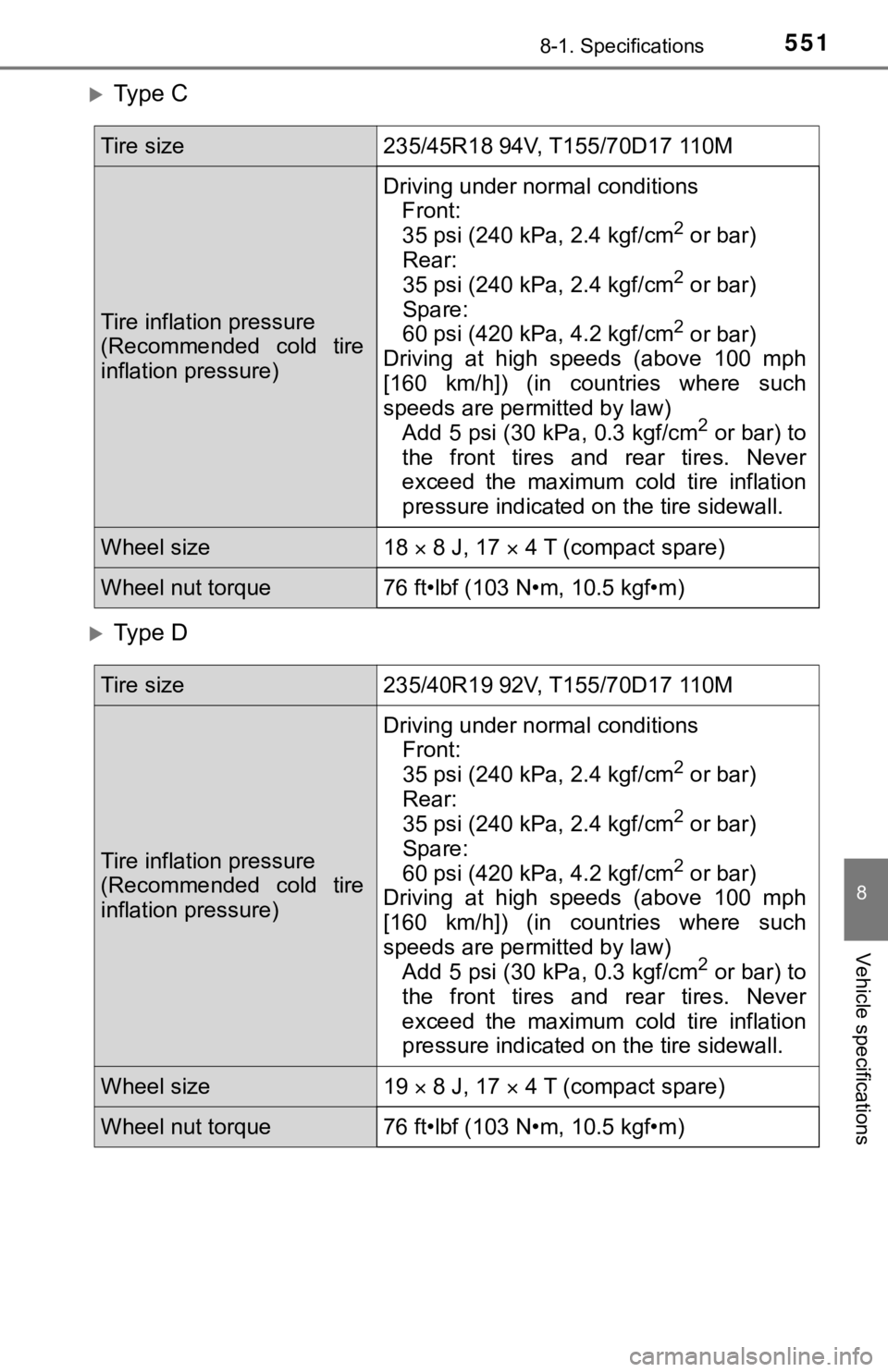
5518-1. Specifications
8
Vehicle specifications
Ty p e C
Ty p e D
Tire size235/45R18 94V, T155/70D17 110M
Tire inflation pressure
(Recommended cold tire
inflation pressure)
Driving under normal conditions
Front:
35 psi (240 kPa, 2.4 kgf/cm
2 or bar)
Rear:
35 psi (240 kPa, 2.4 kgf/cm
2 or bar)
Spare:
60 psi (420 kPa, 4.2 kgf/cm
2 or bar)
Driving at high speeds (above 100 mph
[160 km/h]) (in countries where such
speeds are permitted by law) Add 5 psi (30 kPa, 0.3 kgf/cm
2 or bar) to
the front tires and rear tires. Never
exceed the maximum cold tire inflation
pressure indicated on the tire sidewall.
Wheel size 18 8 J, 17 4 T (compact spare)
Wheel nut torque76 ft•lbf (103 N•m, 10.5 kgf•m)
Tire size 235/40R19 92V, T155/70D17 110M
Tire inflation pressure
(Recommended cold tire
inflation pressure)Driving under normal conditions
Front:
35 psi (240 kPa, 2.4 kgf/cm
2 or bar)
Rear:
35 psi (240 kPa, 2.4 kgf/cm
2 or bar)
Spare:
60 psi (420 kPa, 4.2 kgf/cm
2 or bar)
Driving at high speeds (above 100 mph
[160 km/h]) (in countries where such
speeds are permitted by law) Add 5 psi (30 kPa, 0.3 kgf/cm
2 or bar) to
the front tires and rear tires. Never
exceed the maximum cold tire inflation
pressure indicated on the tire sidewall.
Wheel size 19 8 J, 17 4 T (compact spare)
Wheel nut torque76 ft•lbf (103 N•m, 10.5 kgf•m)
Page 552 of 624
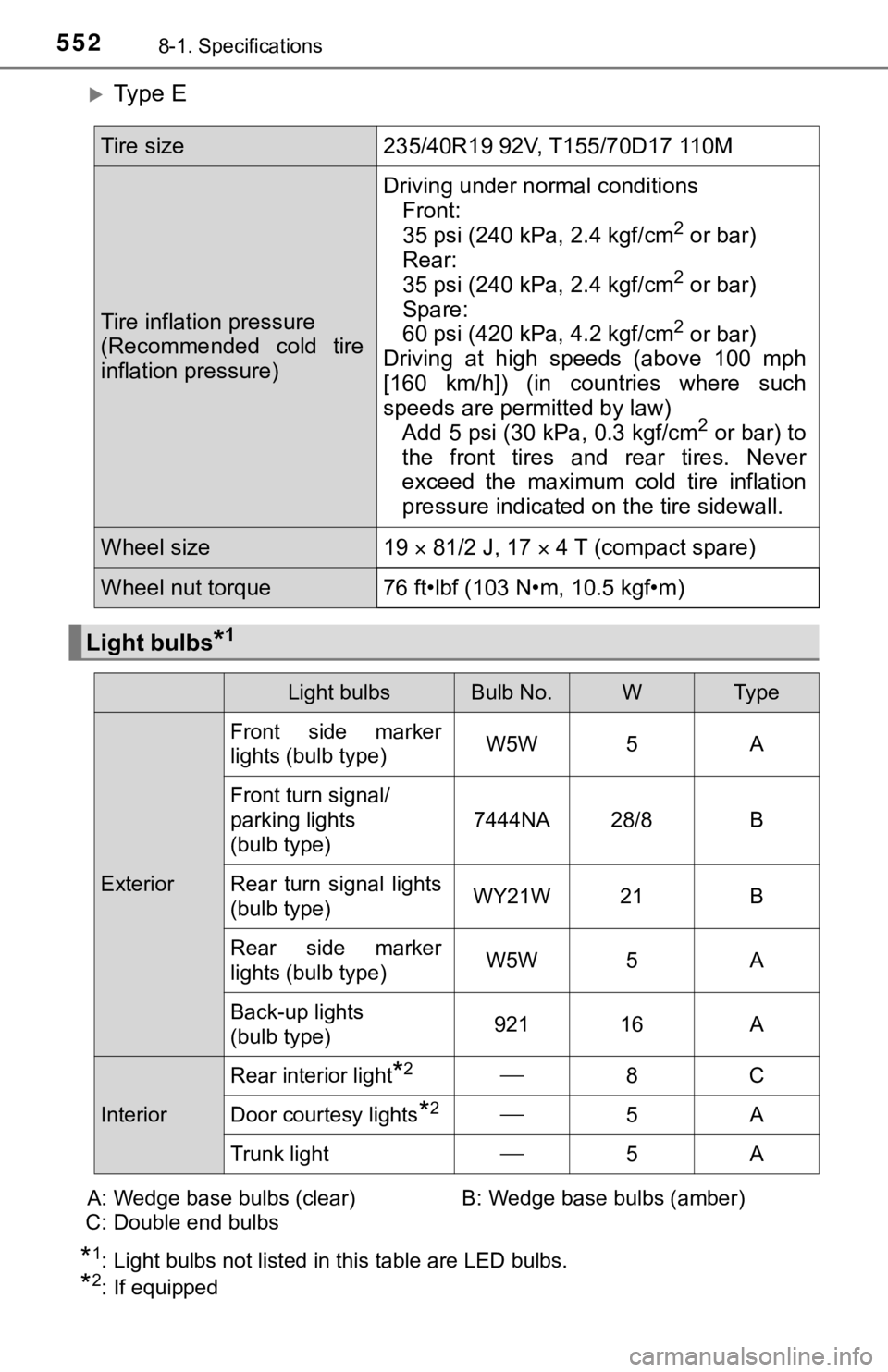
5528-1. Specifications
Ty p e E
*1: Light bulbs not listed in this table are LED bulbs.
*2: If equipped
Tire size235/40R19 92V, T155/70D17 110M
Tire inflation pressure
(Recommended cold tire
inflation pressure)Driving under normal conditions
Front:
35 psi (240 kPa, 2.4 kgf/cm
2 or bar)
Rear:
35 psi (240 kPa, 2.4 kgf/cm
2 or bar)
Spare:
60 psi (420 kPa, 4.2 kgf/cm
2 or bar)
Driving at high speeds (above 100 mph
[160 km/h]) (in countries where such
speeds are permitted by law) Add 5 psi (30 kPa, 0.3 kgf/cm
2 or bar) to
the front tires and rear tires. Never
exceed the maximum cold tire inflation
pressure indicated on the tire sidewall.
Wheel size 19 81/2 J, 17 4 T (compact spare)
Wheel nut torque76 ft•lbf (103 N•m, 10.5 kgf•m)
Light bulbs*1
Light bulbsBulb No.WTy p e
Exterior Front side marker
lights (bulb type)
W5W 5 A
Front turn signal/
parking lights
(bulb type) 7444NA 28/8 B
Rear turn signal lights
(bulb type) WY21W 21 B
Rear side marker
lights (bulb type) W5W 5 A
Back-up lights
(bulb type) 921 16 A
InteriorRear interior light
*2
8C
Door courtesy lights
*2 5A
Trunk light 5A
A: Wedge base bulbs (clear)
C: Double end bulbs B: Wedge base bulbs (amber)
Page 553 of 624
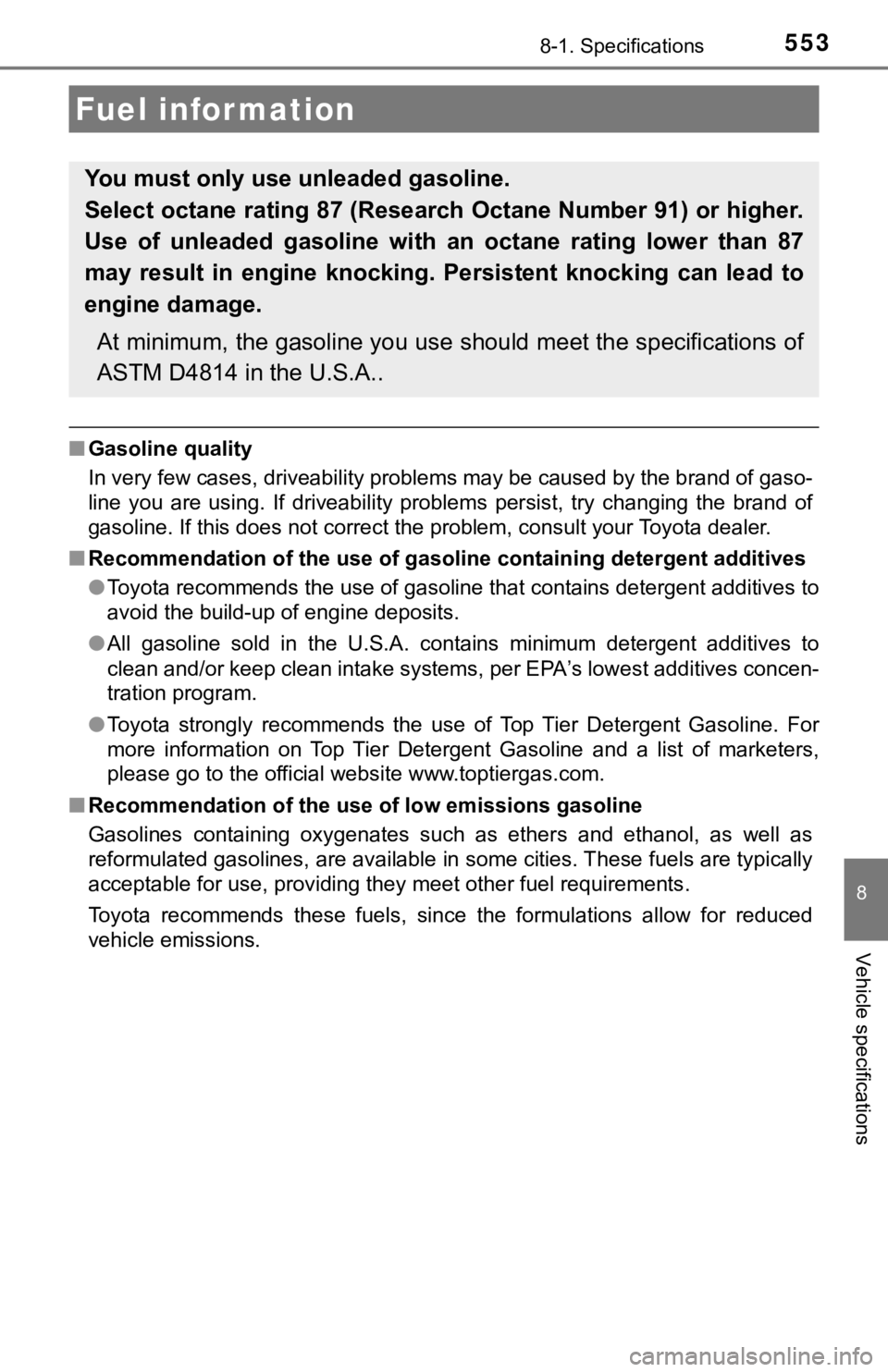
5538-1. Specifications
8
Vehicle specifications
■Gasoline quality
In very few cases, driveability problems may be caused by the b rand of gaso-
line you are using. If driveability problems persist, try changing the brand of
gasoline. If this does not correct the problem, consult your To yota dealer.
■ Recommendation of the use of gaso line containing detergent additives
● Toyota recommends the use of gasoline that contains detergent a dditives to
avoid the build-up of engine deposits.
● All gasoline sold in the U.S.A. contains minimum detergent addi tives to
clean and/or keep clean intake systems, per EPA’s lowest additi ves concen-
tration program.
● Toyota strongly recommends the use of Top Tier Detergent Gasoli ne. For
more information on Top Tier Detergent Gasoline and a list of m arketers,
please go to the official website www.toptiergas.com.
■ Recommendation of the use of low emissions gasoline
Gasolines containing oxygenates such as ethers and ethanol, as well as
reformulated gasolines, are available in some cities. These fue ls are typically
acceptable for use, providing they meet other fuel requirements .
Toyota recommends these fuels, since the formulations allow for reduced
vehicle emissions.
Fuel information
You must only use unleaded gasoline.
Select octane rating 87 (Research Octane Number 91) or higher.
Use of unleaded gasoline with an octane rating lower than 87
may result in engine knocking. Persistent knocking can lead to
engine damage.
At minimum, the gasoline you use should meet the specifications of
ASTM D4814 in the U.S.A..
Page 554 of 624
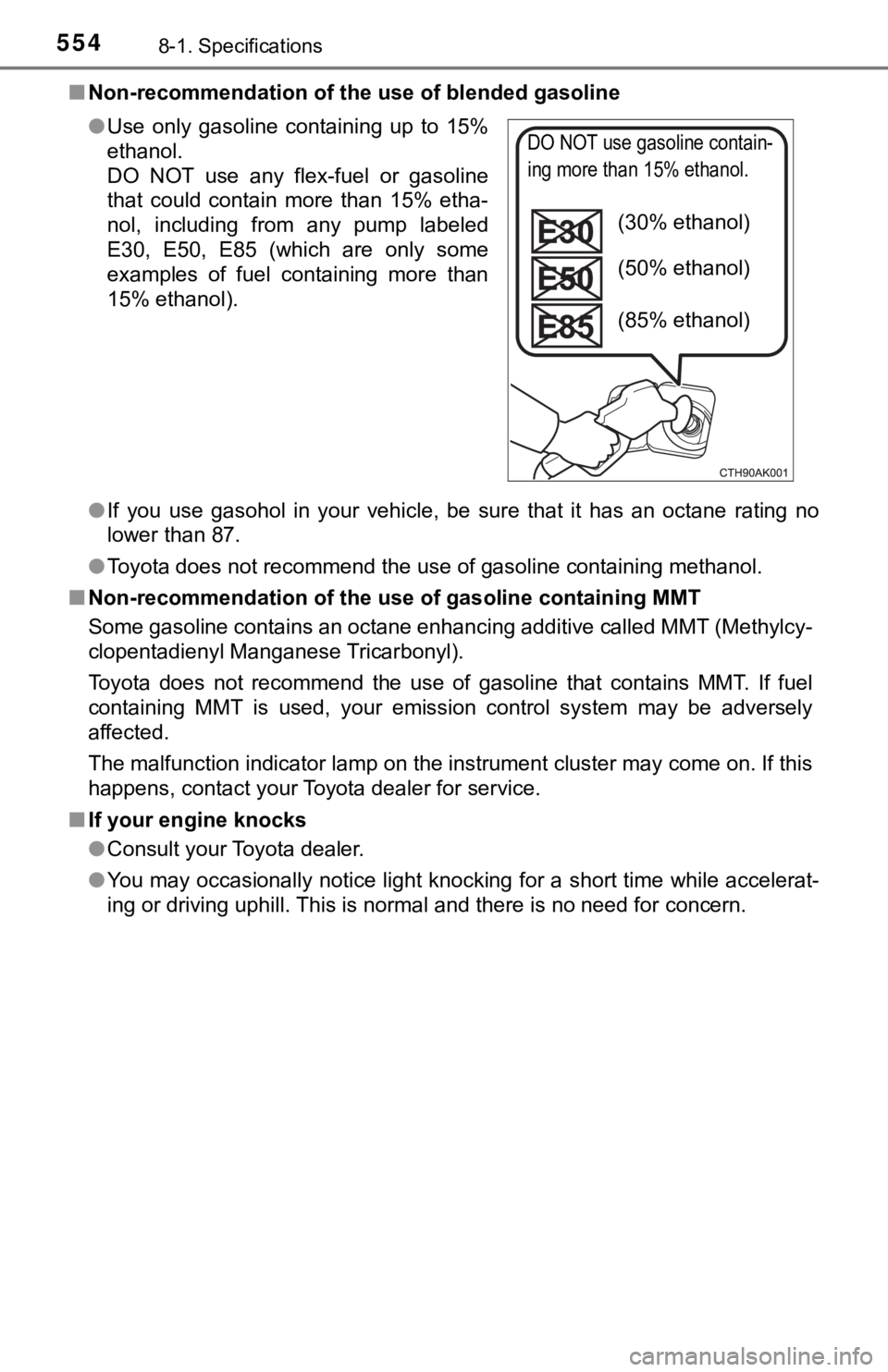
5548-1. Specifications
■Non-recommendation of the use of blended gasoline
●If you use gasohol in your vehicle, be sure that it has an octa ne rating no
lower than 87.
● Toyota does not recommend the use of gasoline containing methan ol.
■ Non-recommendation of the use of gasoline containing MMT
Some gasoline contains an octane enhancing additive called MMT (Methylcy-
clopentadienyl Manganese Tricarbonyl).
Toyota does not recommend the use of gasoline that contains MMT. If fuel
containing MMT is used, your emission control system may be adv ersely
affected.
The malfunction indicator lamp on the instrument cluster may come on. If this
happens, contact your Toyota dealer for service.
■ If your engine knocks
●Consult your Toyota dealer.
● You may occasionally notice light knocking for a short time whi le accelerat-
ing or driving uphill. This is normal and there is no need for concern.
●
Use only gasoline containing up to 15%
ethanol.
DO NOT use any flex-fuel or gasoline
that could contain more than 15% etha-
nol, including from any pump labeled
E30, E50, E85 (which are only some
examples of fuel containing more than
15% ethanol).
DO NOT use gasoline contain-
ing more than 15% ethanol.
(30% ethanol)
(50% ethanol)
(85% ethanol)
Page 555 of 624
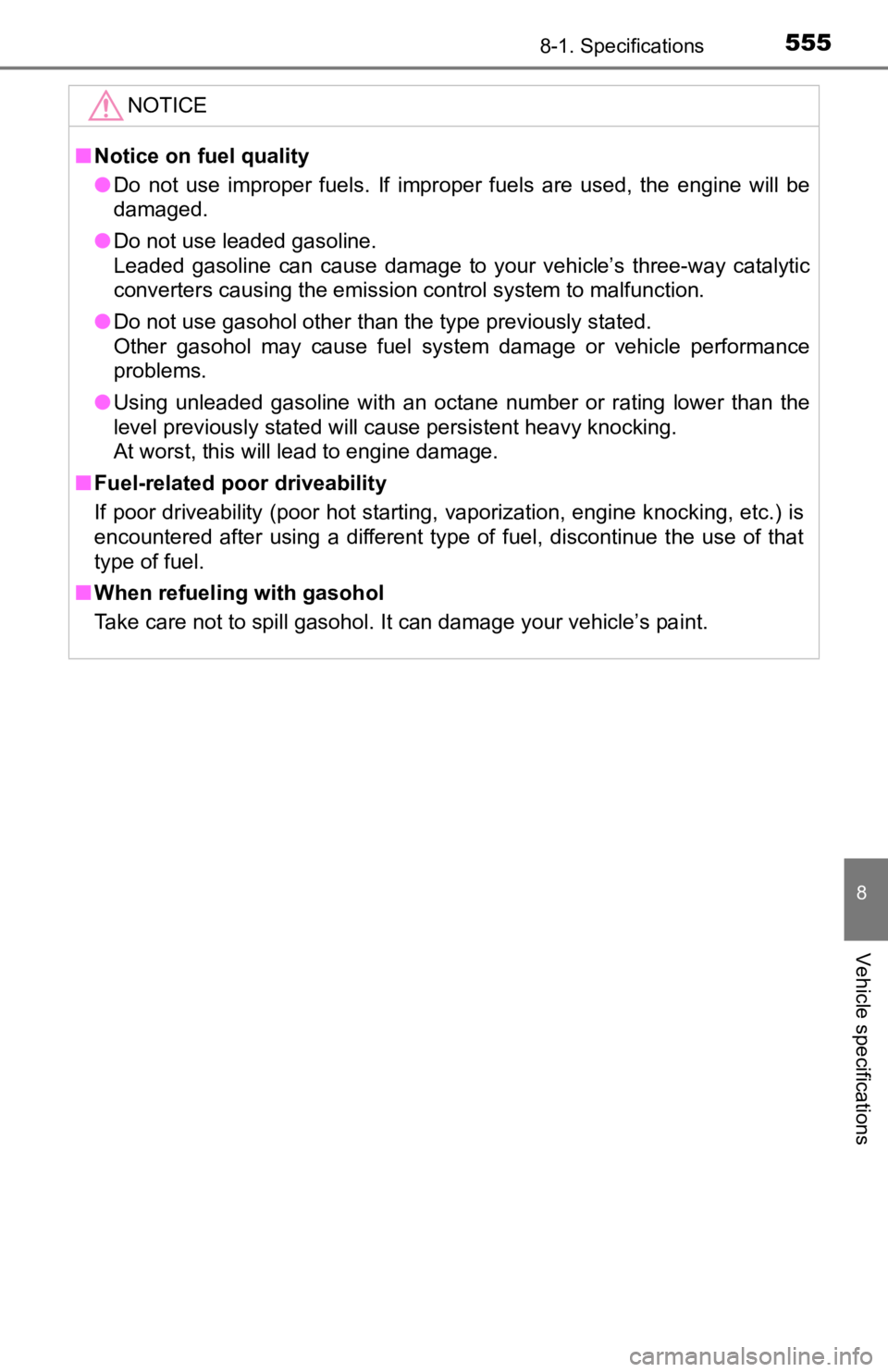
5558-1. Specifications
8
Vehicle specifications
NOTICE
■Notice on fuel quality
● Do not use improper fuels. If improper fuels are used, the engi ne will be
damaged.
● Do not use leaded gasoline.
Leaded gasoline can cause damage to your vehicle’s three-way catalytic
converters causing the emission control system to malfunction.
● Do not use gasohol other than the type previously stated.
Other gasohol may cause fuel system damage or vehicle performance
problems.
● Using unleaded gasoline with an octane number or rating lower than the
level previously stated will cause persistent heavy knocking.
At worst, this will lead to engine damage.
■ Fuel-related poor driveability
If poor driveability (poor hot starting, vaporization, engine k nocking, etc.) is
encountered after using a different type of fuel, discontinue the use of that
type of fuel.
■ When refueling with gasohol
Take care not to spill gasohol. It can damage your vehicle’s paint.
Page 556 of 624
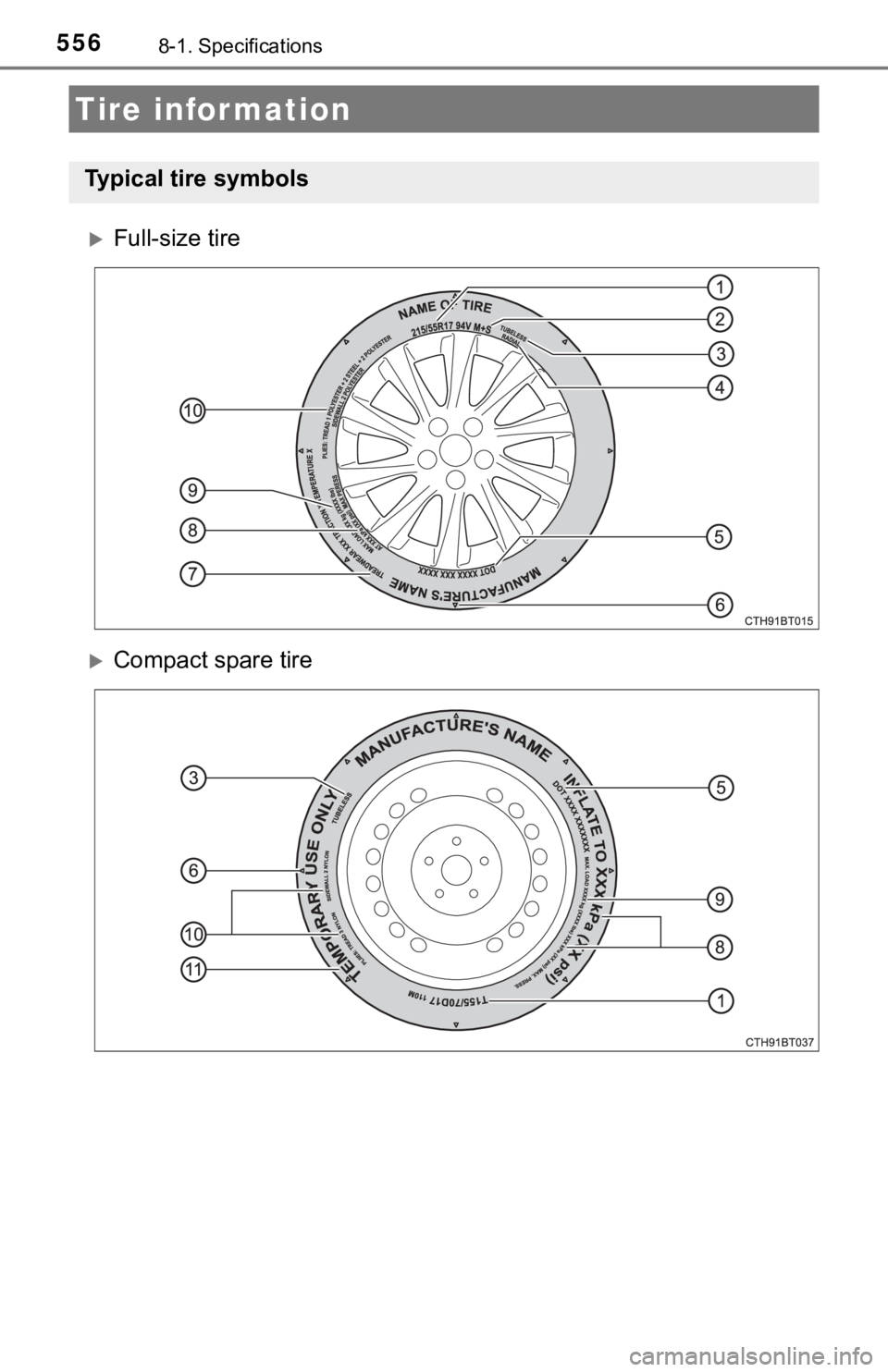
5568-1. Specifications
Full-size tire
Compact spare tire
Tire information
Typical tire symbols
Page 557 of 624
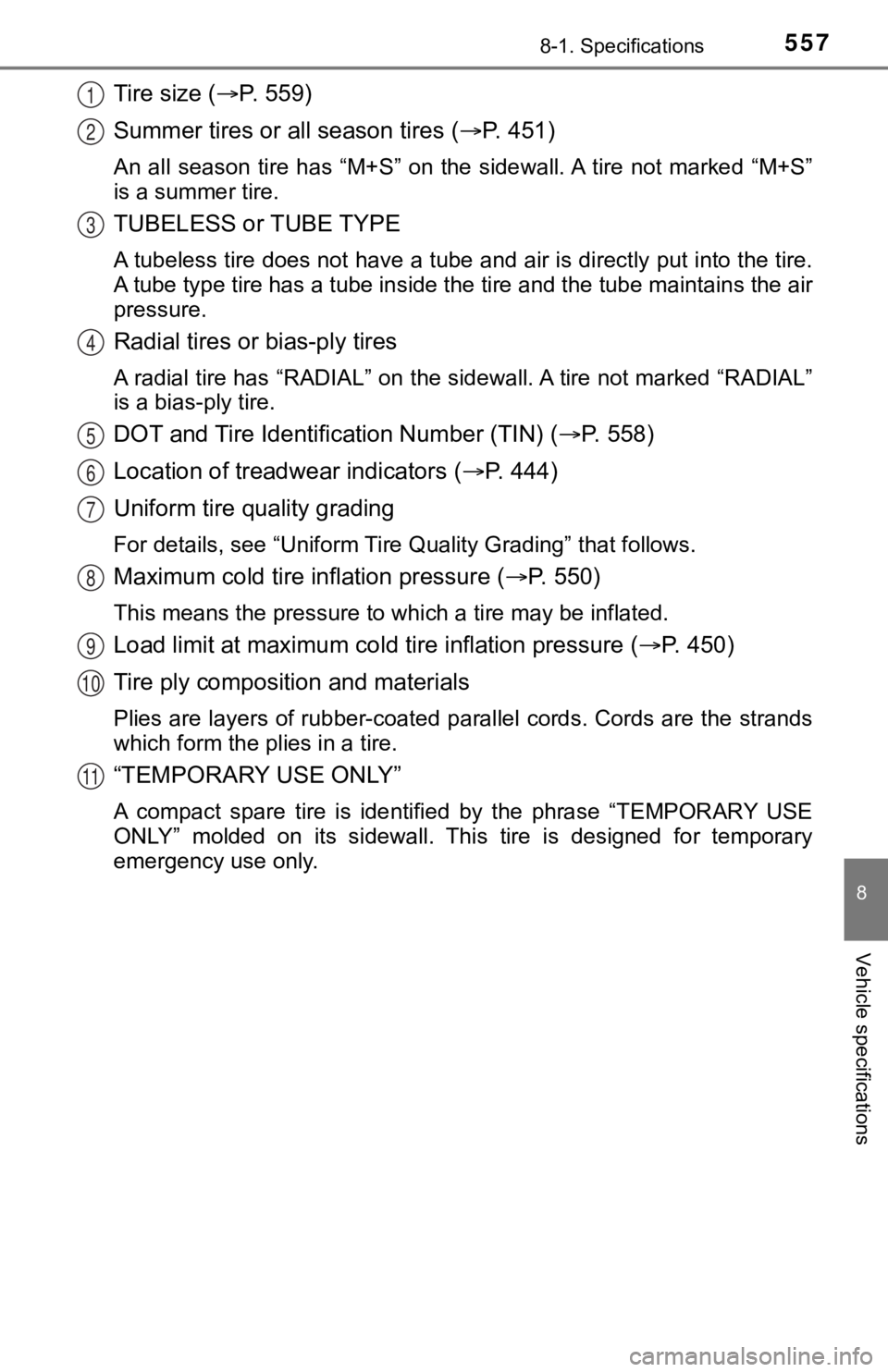
5578-1. Specifications
8
Vehicle specifications
Tire size (P. 559)
Summer tires or all season tires ( P. 4 5 1 )
An all season tire has “M+S” on the sidewall. A tire not marked “M+S”
is a summer tire.
TUBELESS or TUBE TYPE
A tubeless tire does not have a tube and air is directly put into the tire.
A tube type tire has a tube insi de the tire and the tube mainta ins the air
pressure.
Radial tires or bias-ply tires
A radial tire has “RADIAL” on the sidewall. A tire not marked “ RADIAL”
is a bias-ply tire.
DOT and Tire Identification Number (TIN) ( P. 5 5 8 )
Location of treadwear indicators ( P. 4 4 4 )
Uniform tire quality grading
For details, see “Uniform Tire Q uality Grading” that follows.
Maximum cold tire in flation pressure (P. 550)
This means the press ure to which a tire may be inflated.
Load limit at maximum cold tire inflation pressure ( P. 450)
Tire ply composition and materials
Plies are layers of rubber-coated parallel cords. Cords are the strands
which form the p lies in a tire.
“TEMPORARY USE ONLY”
A compact spare tire is identified by the phrase “TEMPORARY USE
ONLY” molded on its sidewall. This tire is designed for tempora ry
emergency use only.
1
2
3
4
5
6
7
8
9
10
11
Page 558 of 624
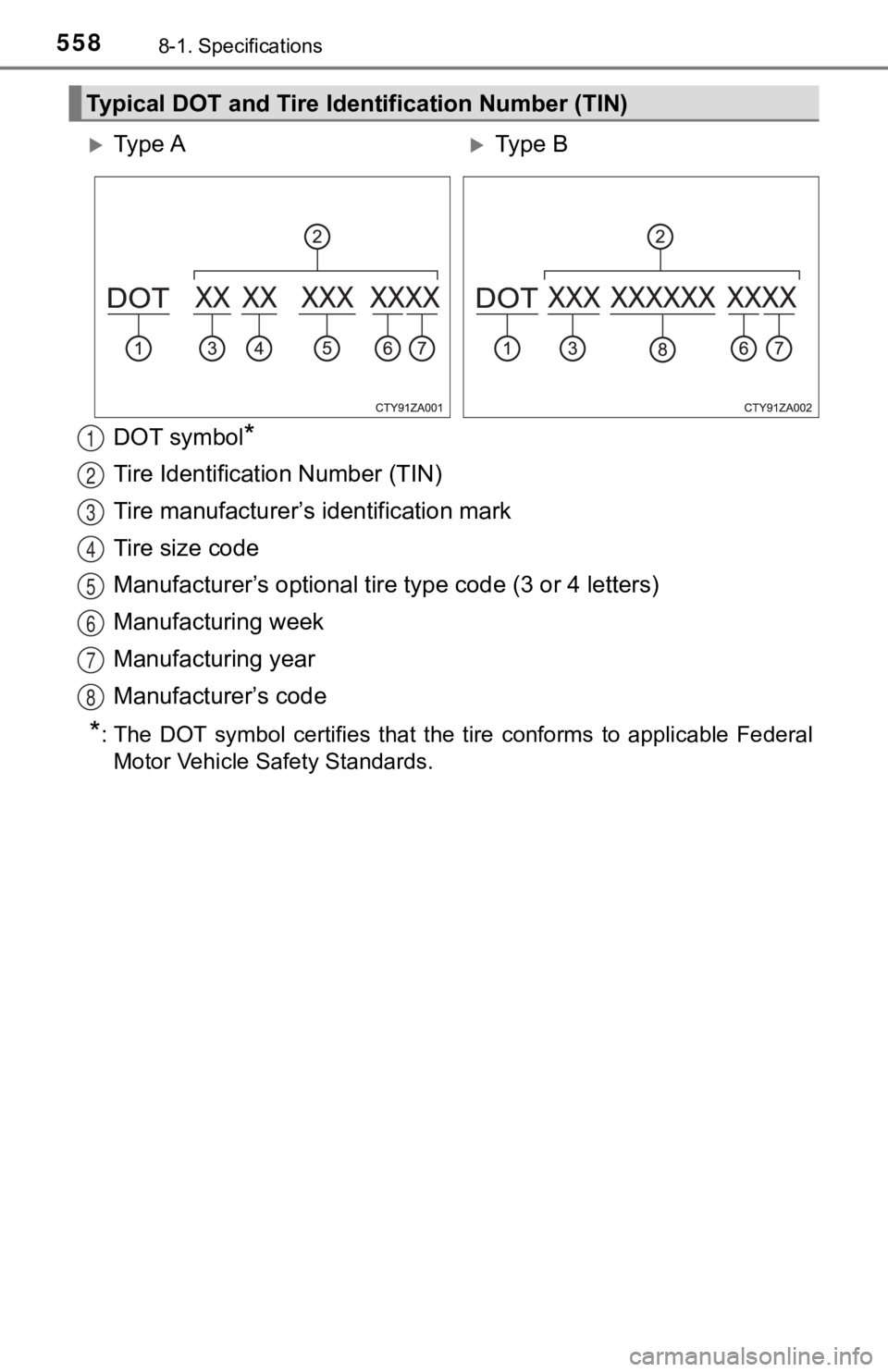
5588-1. Specifications
DOT symbol*
Tire Identification Number (TIN)
Tire manufacturer’s identification mark
Tire size code
Manufacturer’s optional tire type code (3 or 4 letters)
Manufacturing week
Manufacturing year
Manufacturer’s code
*: The DOT symbol certifies that the tire conforms to applicable Federal
Motor Vehicle Safety Standards.
Typical DOT and Tire Iden tification Number (TIN)
Ty p e AType B
1
2
3
4
5
6
7
8
Page 559 of 624
![TOYOTA CAMRY HYBRID 2023 Owners Manual 5598-1. Specifications
8
Vehicle specifications
■Typical tire size information
The illustration indicates typical
tire size.
Tire use
(P = Passenger car [some-
times omitted],
T = Temporary use) TOYOTA CAMRY HYBRID 2023 Owners Manual 5598-1. Specifications
8
Vehicle specifications
■Typical tire size information
The illustration indicates typical
tire size.
Tire use
(P = Passenger car [some-
times omitted],
T = Temporary use)](/img/14/59251/w960_59251-558.png)
5598-1. Specifications
8
Vehicle specifications
■Typical tire size information
The illustration indicates typical
tire size.
Tire use
(P = Passenger car [some-
times omitted],
T = Temporary use)
Section widt h (millimeters)
Aspect ratio
(tire height to section width)
Tire construction code ( R = Radial, D = Diagonal)
Wheel diameter (inches)
Load index (2 digits or 3 digits)
Speed symbol (alphabet with one letter)
■Tire dimensions
Section width
Tire height
Wheel diameter
Tire size
1
2
3
4
5
6
7
1
2
3
Page 560 of 624
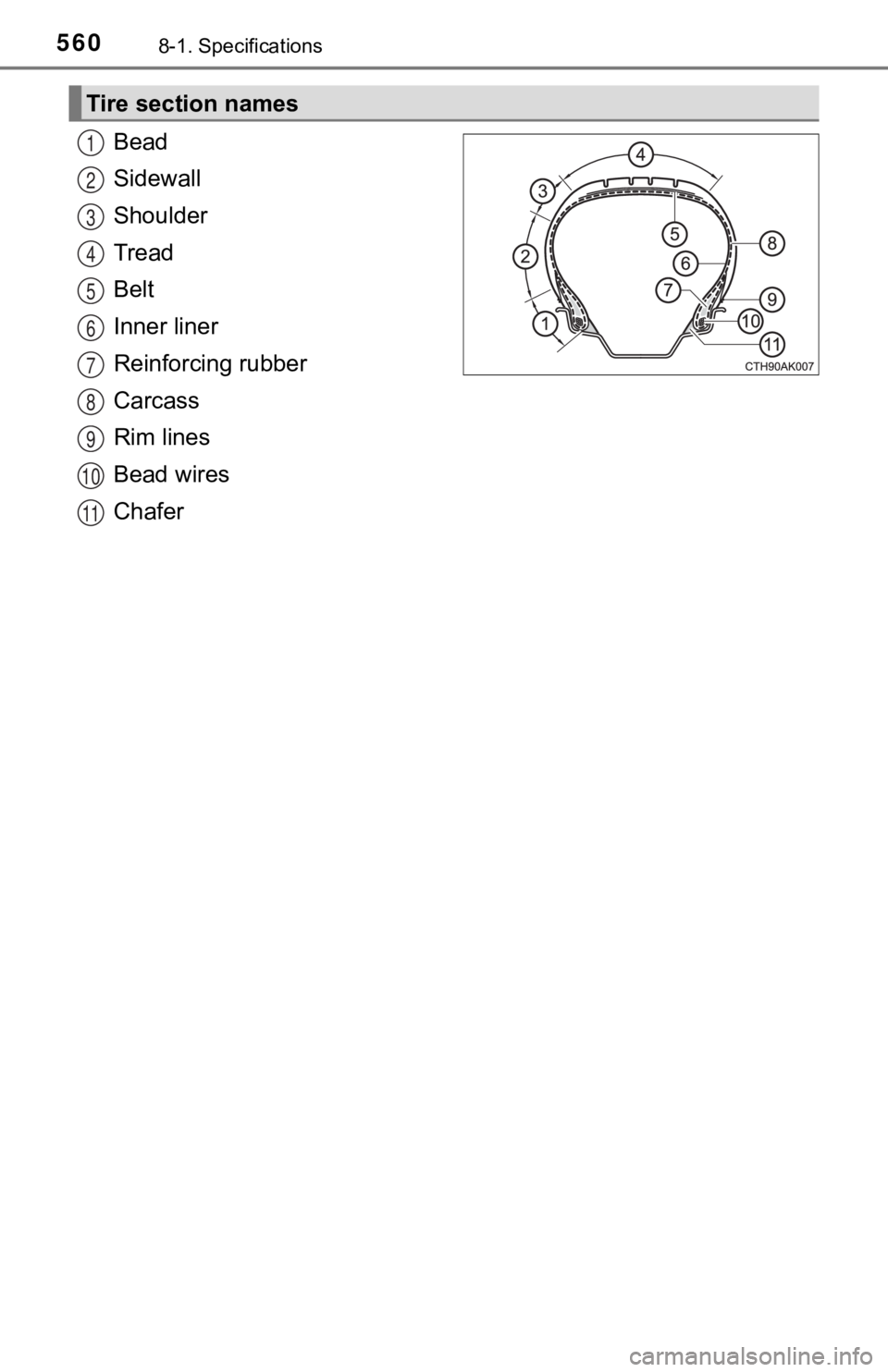
5608-1. Specifications
Bead
Sidewall
Shoulder
Tread
Belt
Inner liner
Reinforcing rubber
Carcass
Rim lines
Bead wires
Chafer
Tire section names
1
2
3
4
5
6
7
8
9
10
11